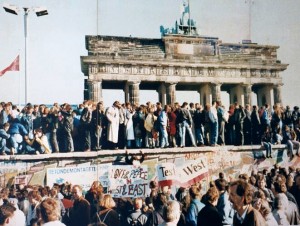
We may not all see it, but it’s there. Solid and expansive. It is not a surprise that most people assume it has been here since the very beginning of time. However, there are some who have challenged it. These select groups have put forth valiant efforts to scale its sides or perhaps tunnel below its foundations. While somewhat successful, I believe that for the sake of the majority, it should not merely be routed by the few who are able, but rather, it must be demolished completely. I also believe that if we want it gone, we must establish a unified effort to break it apart brick by brick. “Tear down this wall” are the infamous words of the late president Ronald Reagan who was speaking about the wall that divided East and West Berlin in the late 1980s. I am speaking about the wall that divides the church from the very culture it is trying to love and impact.
I read a lot of books and in this season I am particularly intrigued by anything speaking on the topic of culture. This sentence jumped out at me a few weeks ago and I haven’t been able to shake it, so I will share it with you:
“In the church, we often spend the majority of our time teaching people how to live the minority of their lives” John Mark Comer – Garden City
In the church, we preach a religion of morals and ethics to our people. We teach them how to live holy lives and how to serve. We equip the congregation to honor God and to love others. We show people how to grow in sanctification and how to be an active part of the body of Christ. We do a lot of great things, but there is a lack and thus there is a wall. I am not sure how we missed it, but in good intentions we have neglected to intersect the space we inhabit for the majority of our time. We have built a structure that separates our very lives in the church from what we do with the actual majority of our time.
If we have a church community that spends time in the word and in prayer and in serving the community, but does not know how to apply biblical principals, identify or address greater calling in their work, we have missed something so big it should unsettle us. Look around, we are living in a time with very few innovators in Christianity. I would argue that a major problem and complication contributing to this is that we push members to serve the church. This sounds almost heretical I know, but hear me out. If we are creating an infrastructure of church-activity that will collapse on itself if it does not have the support of so many volunteers holding it up, what are we missing? The answer is work. We are missing how to equip the body of Christ to live the lion share of their lives. Work is a good and holy thing. In Genesis 2, God claimed work as an act of worship (I will expand on this more in my next blog). I think church events are necessary, however I do not think that they should overshadow the life that happens the other six days of the week. Good moral teaching and biblical principles need to extend to where the majority of people live their lives. If the church is requiring so much of its members that it abandons and diminishes its ability to equip people, and if it limits them from taking what they learn Sundays and small groups to their cultures, we need to stop and reevaluate the purpose of the church.
There, I said it.
An easy way to tell if balance needs to be restored is to examine the culture of the church. We must look and determine if a culture has been created that beckons people to impact the church to the degree that now it must be sustained. If this is the case, there is a problem. Although this situation is born out of good intentions, the inevitable byproduct is that spiritual impact only happens in spiritual environments at spiritual events, rather than in every day lives. Thus a wall now divides the sacred from the secular. We must ask ourselves “is the church signing up to impact the community or is the community signing up to impact the church?” If we are calling people to come into our sanctuaries, fellowship halls and other church spaces and if we are asking them to devote the majority of their free time to do all of the necessary jobs and tasks to keep the church running and to be a part of every event we host, what are we saying to our people? What are we saying to our revolutionaries and innovators? Or even more importantly, are we even looking for these people in our communities?
Now we see the wall and why it is limiting the church, but how will we tear it down? I love the book of Nehemiah. Although it’s a little backwards for our purposes in that he built a wall where as we are looking at how to break one down, I believe the message applies. In rebuilding the city, Nehemiah first addressed the physical needs of the people: they were in debt, their walls were destroyed, and they needed a plan to rebuild. It was only after taking care of these things did Nehemiah reestablish the law of God. Today, perhaps Nehemiah would be the guy to rebuild a broken city like the heart of Chicago. If Nehemiah walked into the doors of your church or my church, would he be encouraged to go and create change like this, or would he be asked and encouraged to lead a bible study and possibly frowned upon if he declined? What gifts are being thrown away by our well intentioned church assimilation systems? If we were to teach Nehemiah how to lead a prayer group, but neglected to encourage him to go and meet the needs of a city, we would potentially cause Nehemiah to intensely miss out on all that God wanted to do in and through his life.
I believe that there are Nehemiahs in our church today with walls to build. I believe one of the major purposes of the church is to launch these people to build their walls. In light of this, we have no other choice but to work together to disassemble the divide between the sacred and secular to make this happen. This structure must come down. We must equip people to find the sacred in the un-sacred places they spend their time in. We need to strive for this freedom to be granted to the body of the church. I believe that if we do, we will unleash revolutionaries, we will experience transformation in our culture and we will bring honor to the name of Jesus throughout the earth. In the words of Reagan, “This wall will fall. Beliefs become reality. Yes…this wall will fall. For it cannot withstand faith; it cannot withstand truth. The wall cannot withstand freedom.”











